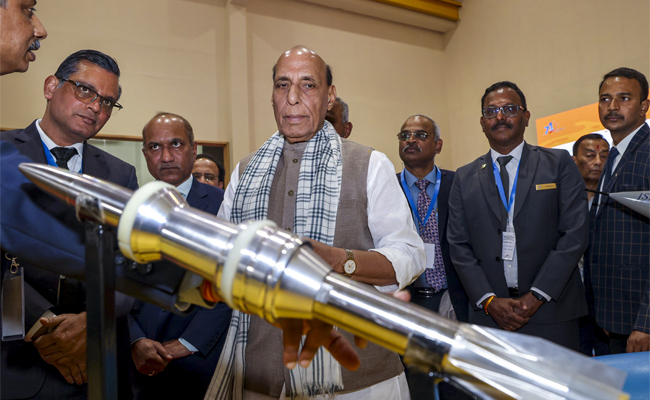Melbourne (PTI): Australia's most successful T20 International batter and captain Aaron Finch, who led the country to its maiden shortest format World Cup triumph in 2021, announced his retirement from international cricket on Tuesday.
The 36-year-old will, however, continue to play for the Renegades in the Big Bash League and would consider domestic T20 opportunities in other countries.
"Our World Cup winning, longest serving men's T20I captain has called time on a remarkable career. Thanks for everything @AaronFinch5," Cricket Australia (CA) said on its official Twitter handle.
Finch's retirement from international cricket was on expected lines. He played just five Tests, the last one being in 2018, and retired from the ODIs last year after a much-publicised struggle for form as captain of the Australian team.
He captained the team to their first T20 World Cup title when they defeated New Zealand in Dubai in 2021 and is one of only four male Australians to captain a World Cup winning side.
But, the Australian team under him failed to qualify for the semifinals T20 World Cup at home last year. His last international match came in the T20 showpiece when he top-scored with 63 as Australia beat Ireland by 42 runs.
"Realising that I won't be playing on until the next T20 World Cup in 2024, now is the right moment to step down and give the team time to plan and build towards that event," Finch told reporters at the Melbourne Cricket Ground.
"I also want to say a huge thank you to all the fans who have supported me throughout my international career."
The long-term white-ball skipper and longest-serving T20I captain represented Australia in 254 international matches across all formats, playing five Tests (278 runs), 146 ODIs (5406 runs) and 103 T20Is.
Since making his international debut in a T20I in January 2011, Finch amassed 8,804 runs in all formats which includes 17 ODI centuries and two T20I tons.
Finch led Australia in a world record 76 men's T20Is, as well as in 55 ODIs, before his retirement. He is Australia's most prolific T20I batter with 3120 runs from 103 matches at an average of 34.28, with two hundreds and 19 fifties, and a strike-rate of 142.53.
He also holds the record for the highest score in a T20I when blasting 172 runs from just 76 balls against Zimbabwe in Harare in 2018, an incredible knock that included 10 sixes and 16 fours.
Finch was also a part of the Australia team that won the ICC Men's Cricket World Cup in 2015.
"Team success is what you play the game for and the maiden T20 World Cup win in 2021 and lifting the ODI World Cup on home soil in 2015 will be the two memories I cherish the most," Finch said.
"To be able to represent Australia for 12 years and play with and against some of the greatest players of all time has been an incredible honour."
Finch said he is hopeful of playing franchise cricket, insisting that it is only the "international cricket that I'm walking away from at the moment."
"I'm hopeful to play in The Hundred (in the UK) because that's a competition I was really excited about for a couple of years, but then didn't get the opportunity with COVID and then some tours that came up," he said.
"And if anything else pops up and it's at the right time, I'd definitely be interested."
Finch, who has represented nine IPL teams, will also be commentating during the upcoming season of the league and the ODI World Cup in India later this year.
"Plus I've been lucky enough to sign with Star India for some commentary stuff through the IPL and the 50-over World Cup (in India later this year), so that will be good fun.
"I've loved the broadcast side of it, since I've done a bit more of it this year and last year. You get to sit there and watch cricket and talk about it it's the best job in the world, besides playing."
Let the Truth be known. If you read VB and like VB, please be a VB Supporter and Help us deliver the Truth to one and all.
New Delhi: A visit by the US Ambassador to India, Sergio Gor, to Chandigarh on Monday has triggered sharp criticism from opposition leaders and social media users, raising questions about national security and foreign policy.
On X, Ambassador Gor announced his visit, writing, “Just landed in Chandigarh. Looking forward to visiting the Western Command of the Indian Army.”
Just landed in Chandigarh. Looking forward to visiting the Western Command of the Indian Army
— Ambassador Sergio Gor (@USAmbIndia) February 16, 2026
Soon after, opposition voices questioned the broader implications of the visit. Congress Kerala, in a post, commented, “Why so much panic? We’ve already seen Pakistan's ISI getting access to Pathankot Airbase with this government's blessings. Didn't they say then ‘Modi ne kiya ho to kuch soch samajh kar kiya hoga?’ Compared to that, this is very small.”
Why so much panic? We’ve already seen Pakistan's ISI getting access to Pathankot Airbase with this government's blessings.
— Congress Kerala (@INCKerala) February 16, 2026
Didn't they say then "Modi ne kiya ho to kuch soch samajh kar kiya hoga?"
Compared to that, this is very small. pic.twitter.com/gNNuAGQBPC
Shiv Sena (UBT) leader Priyanka Chaturvedi also weighed in, writing, “Since India’s national strategic interests are now tied to what US wants India to do, this visit seems to sync with that.”
She further added, “India’s history will remember the de-escalation announcement between India and Pak was announced on social media by the US President before Indians got to know from their own government. US Ambassador is doing the job for his nation, who is doing for us? The answer is blowing in the wind.”
Since India’s national strategic interests are now tied to what US wants India to do, this visit seems to sync with that. India’s history will remember the de-escalation announcement between India and Pak was announced on social media by the US President before Indians got to… pic.twitter.com/rYMq5NhJHA
— Priyanka Chaturvedi🇮🇳 (@priyankac19) February 16, 2026
The visit comes against the backdrop of the growing US-India defence partnership.
Writer and political analyst @rajuparulekar commented on ‘X’, “East India Company is back!”
“Is it allowed for an ambassador to visit any army unit in india?” asked another user.
Several X users expressed concerns over the appropriateness of the visit.
One asked, “Is it allowed for an ambassador to visit any army unit in India?” Another wrote, “Why an ambassador visiting our army places? To talk to Chandigarh lobby for F-35?”
Why an ambassador visiting our army places ? To talk to chandigarh lobby for f-35 ??
— Rohan Sagar (@RohanSagar03) February 16, 2026
“We have completely sold Indian sovereignty. Rothschild the evil Bankers will now control NSE. Modi sold Bharat Mata to Trump . And now American imperialist is visiting our army command . Scary,” wrote another user.
“The Indian Army isn’t part of geopolitics, so why is he interested in visiting there?,” opined another.
The Indian Army isn’t part of geopolitics, so why is he interested in visiting there?
— Aditya Pratap Singh (@Adi_IIMCIAN) February 16, 2026
On Sunday, Gor welcomed Admiral Samuel Paparo, Commander of the United States Indo-Pacific Command (INDOPACOM), highlighting efforts to expand the growing US-India defence partnership.
In a post on X, Gor wrote, “Delighted to have @INDOPACOM Commander Admiral Samuel Paparo in India to expand the U.S.-India defense partnership. Now is the time to strengthen vital cooperation between our two nations.”
On Monday, Admiral Samuel J. Paparo Jr visited the headquarters of India’s Western Army Command along with the American envoy Sergio Gor. The delegation was briefed on the formation’s capabilities, its past operations, and future plans.
The American delegation also visited Bengaluru, where they met three start-ups, two in the space sector and one in defence, and participated in an Indo-US conference.





